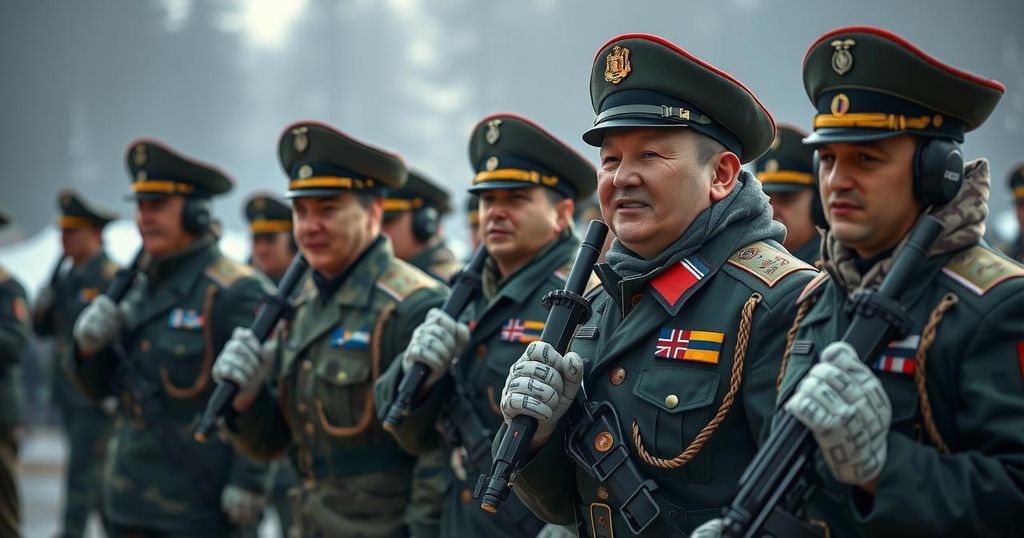Finnish President Stubb Critiques North Korea’s Troop Deployment to Russia as Escalation
Finnish President Alexander Stubb has voiced concerns regarding North Korea’s deployment of troops to Russia, viewing it as an escalation of the Russia-Ukraine war. Following discussions with Chinese President Xi Jinping, Stubb pointed out that such actions contradict China’s calls for peace and restraint. He emphasized the importance of ongoing diplomatic efforts to resolve the conflict while addressing the potential implications of trade tensions between China and Europe.
During a recent press conference, Finnish President Alexander Stubb declared that North Korea’s recent deployment of troops to Russia marks a significant escalation in the ongoing Russia-Ukraine conflict. Stubb made these remarks following extensive discussions with Chinese President Xi Jinping, emphasizing that such actions contradict China’s established position against escalation on the battlefield. President Stubb specifically criticized North Korea’s activities, including arms exports, describing them as both provocative and expansionary. Reports from the United States government indicate that North Korea has sent approximately 10,000 troops to Russia, potentially for deployment in the Kursk border area—a region currently under dispute due to Ukrainian advances. Stubb underscored the inconsistency of this military movement with China’s earlier statements advocating for restraint and peace. Furthermore, the Finnish President urged China to persist in its diplomatic efforts to foster peace in Ukraine, citing Ukraine’s peace plan as a crucial starting point. Stubb expressed apprehensions regarding the potential introduction of nuclear weapons by Russian President Vladimir Putin during the conflict, highlighting the importance of dialogue between China and Russia as a means of de-escalation. In their discussions, President Xi Jinping acknowledged China’s readiness to collaborate with “all parties concerned,” including Finland, to promote a peaceful resolution to the crisis. The two leaders, having last met 14 years ago, engaged in a dialogue that addressed military support for Ukraine and the implications of trade relations between China and Europe. Notably, Finland is pro-actively involved in military and civilian assistance to Ukraine and joined NATO as a response to Russia’s actions, maintaining a firm stance against Moscow. While there are ongoing critiques towards China’s support for Russia, notably from the United States and NATO, President Stubb cautioned against escalating trade tensions, particularly with impending tariffs on Chinese electric vehicles. He called for a focus on avoiding an escalation in trade conflicts.
The current geopolitical landscape is significantly influenced by the ongoing war in Ukraine and its ramifications. Finland, having a land border of over 1,340 kilometers with Russia, is acutely aware of the security dynamics at play due to Russia’s invasion of Ukraine. In this context, Finland’s decision to join NATO last year reflects its commitment to countering Russian aggression. Additionally, as a major provider of military and humanitarian support to Ukraine, Finland is invested in the peace process. China’s stance on the conflict, which advocates for no further escalation, is of particular interest as North Korea’s actions appear at odds with this position, raising critical questions about international diplomacy and conflict resolution in a multi-polar world.
In conclusion, President Alexander Stubb’s remarks regarding North Korea’s troop deployment to Russia highlight not only a troubling escalation in military tensions but also a challenge to China’s peace advocacy in the Russia-Ukraine conflict. As Finland continues to bolster its support for Ukraine and engage in critical discussions with global leaders, the interplay of military, political, and economic factors will be crucial in shaping the future of European security and international relations. The ongoing dialogue between China and Finland, coupled with careful navigation of trade issues, could play a vital role in addressing these complex challenges.
Original Source: apnews.com




Post Comment